France has been witnessing a wave of violent protests in the wake of a tragic incident involving the shooting death of a 17-year-old by the police. As tensions escalated, the third consecutive night of protests saw over 400 individuals being arrested. This surge of unrest has brought attention to the underlying issues and ignited a broader debate about policing, social justice, and public order in the country.
The incident that sparked the protests occurred when a 17-year-old youth was fatally shot by a police officer under disputed circumstances. The details surrounding the event are still under investigation, but the incident struck a nerve among many who perceive a pattern of excessive force and abuse of power by law enforcement. The shooting of a young person, particularly in a community already grappling with social and economic challenges, served as a catalyst for pent-up frustration and anger to erupt onto the streets.
The subsequent protests have been marked by clashes between demonstrators and law enforcement, with instances of violence, property damage, and confrontations. Demonstrators have voiced their grievances, demanding justice for the deceased teenager and calling for systemic reforms to address perceived issues of police brutality, racial discrimination, and social inequality.
The protests have also highlighted broader societal concerns, such as the lack of opportunities and support for marginalized communities. Many argue that the incident reflects systemic issues related to socioeconomic disparities, racial tensions, and a perceived disconnect between law enforcement and the communities they serve. As the protests continue, they not only address the specific incident but also serve as a platform for broader demands for social change.
The French government is facing the challenge of maintaining public order while addressing the underlying issues that have fueled the protests. Authorities have emphasized the importance of allowing peaceful demonstrations and freedom of expression while condemning violence and acts of vandalism. Efforts are being made to engage in dialogue with community leaders, activists, and representatives from affected neighborhoods to address concerns and find common ground for effective solutions.
The ongoing protests and the broader conversation they have sparked are likely to have political and societal implications in France. The government will face pressure to respond proactively and take meaningful steps toward addressing the underlying issues raised by the demonstrators. The incident and subsequent unrest also serve as a reminder of the importance of transparency, accountability, and a comprehensive approach to addressing issues of policing, social justice, and community engagement.
As the situation continues to evolve, it is crucial for all stakeholders to prioritize constructive dialogue, empathy, and the pursuit of equitable solutions. By addressing the root causes of the protests and working towards meaningful change, France has the opportunity to build stronger relationships between law enforcement and the communities they serve, fostering trust, unity, and social cohesion.
